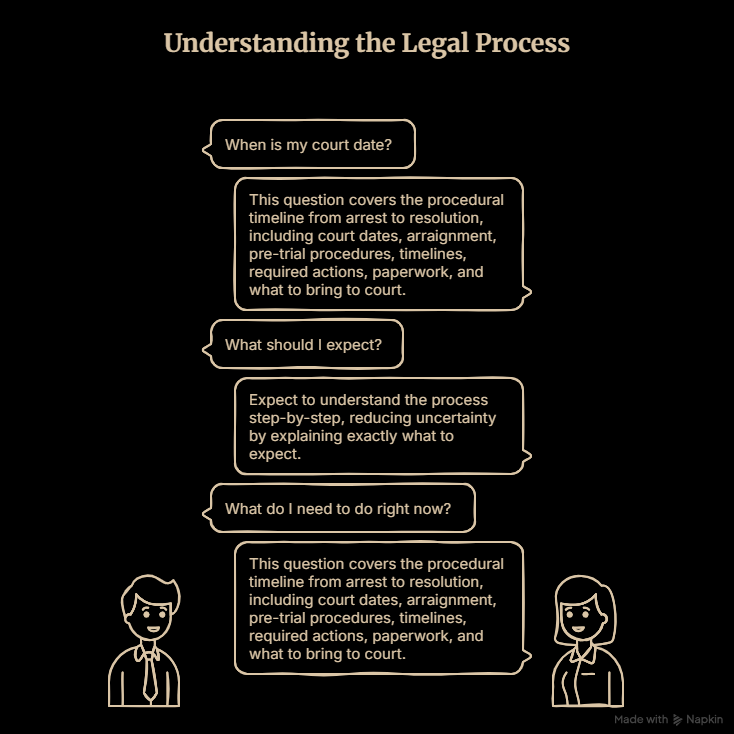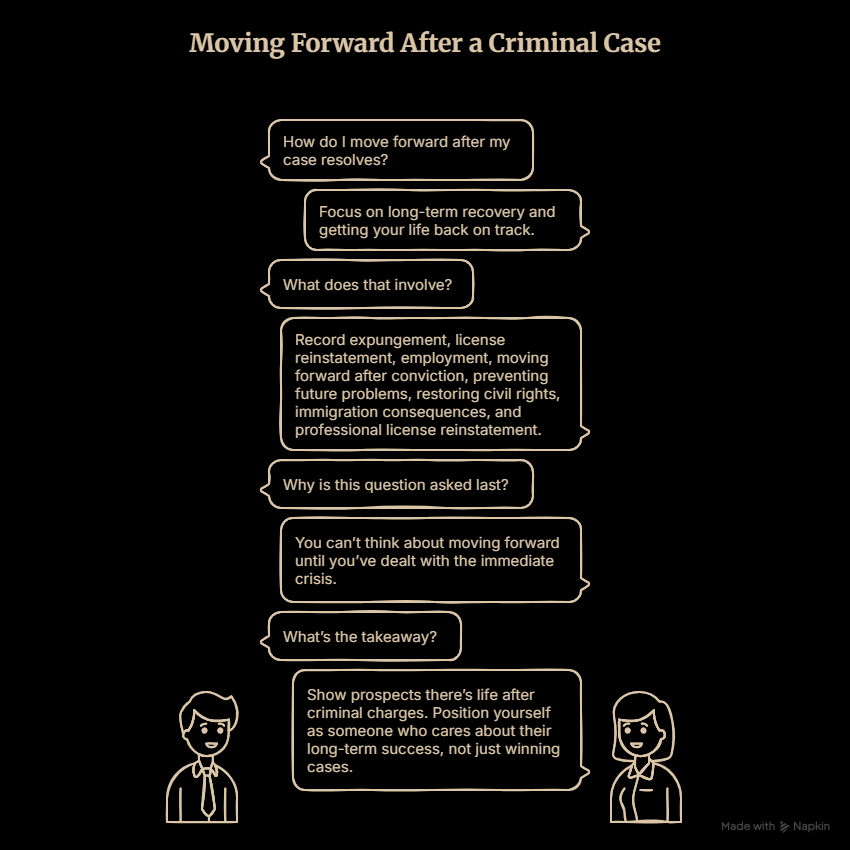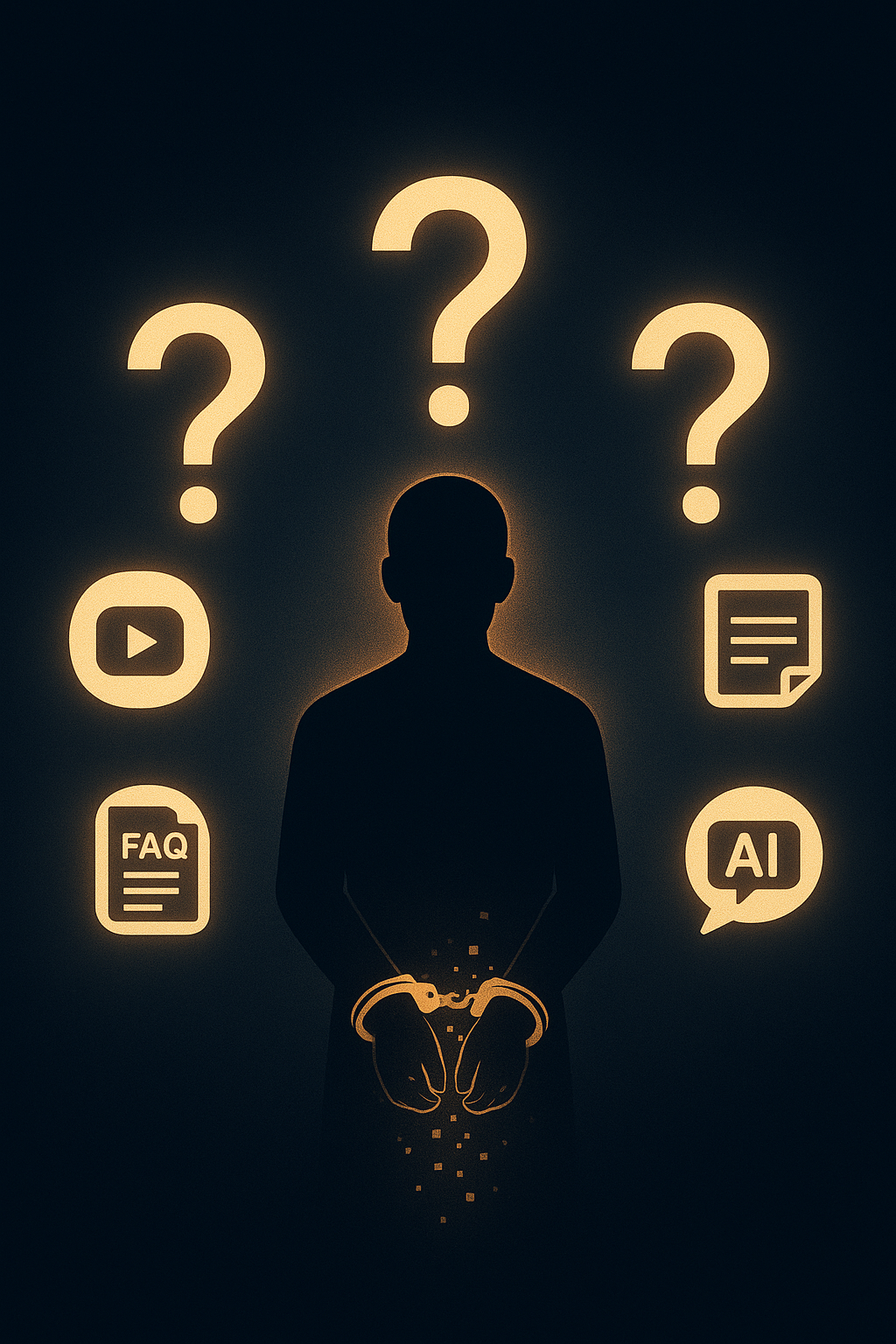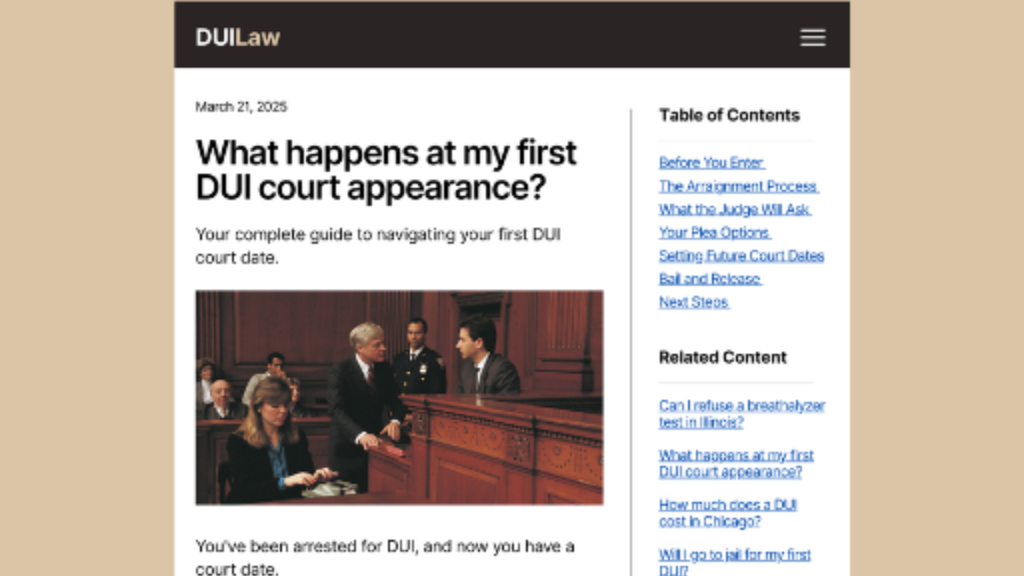I’ve analyzed thousands of search queries from people facing criminal charges.
Doesn’t matter if they’re arrested for DUI, domestic violence, theft, or drug possession. Rich or poor. First-time offender or repeat. College graduate or high school dropout.
Everyone asks the same six questions.
Understanding these questions is the key to creating criminal defense content that actually converts prospects into clients. Because when you answer what they’re really thinking, you build trust instantly.
Here are the six universal questions every arrestee asks, in the exact order they think them.
Question 1: “How Much Trouble Am I In?”
This is always the first question. Always.
Someone who got arrested last night isn’t thinking about legal procedures or court processes. They’re thinking about consequences. Will I go to jail? Will I lose my job? Will this ruin my life?
This question covers everything related to penalties, punishments, and life impact:
- Jail time and prison sentences
- Fines and court costs
- License suspensions
- Professional license consequences
- Employment impact
- Background check implications
- Immigration consequences
- Housing and education effects
Content examples for drug DUI:
- “Will I Go to Jail for First-Time Drug DUI in Illinois?”
- “How Does Drug DUI Affect My Nursing License?”
- “Can I Lose My CDL for Prescription Drug DUI?”
- “What Happens if I’m on Probation and Get Drug DUI?”
Why this question comes first: Fear drives everything when you’re facing charges. People need to understand the worst-case scenario before they can think rationally about anything else.
Takeaway: Lead with consequences, not procedures. Answer their fear before you explain the law.

Question 2: “What Happens Next?”
Once they understand the potential consequences, they want to know the process.
This isn’t about legal strategy or defense options yet. It’s about immediate next steps and timelines. When is my court date? What should I expect? What do I need to do right now?
This question covers the procedural timeline from arrest to resolution:
- Court dates and appearances
- Arraignment process
- Pre-trial procedures
- Timeline expectations
- Required actions
- Paperwork and deadlines
- What to bring to court
- How long cases typically take
Content examples for domestic violence:
- “What Happens at My First Court Date for Domestic Battery?”
- “How Long Does a Domestic Violence Case Take in Cook County?”
- “What Should I Bring to My Arraignment for Domestic Battery?”
- “When Will I Get My Court Date for Domestic Violence?”
Why this question comes second: Once people understand they’re in serious trouble, they need to know what’s going to happen to them. It’s about regaining some sense of control in a chaotic situation.
Takeaway: Create content that walks them through the process step-by-step. Reduce uncertainty by explaining exactly what to expect.

Question 3: “Can I Fight This?”
Now they’re ready to think about their options.
This is where defense strategies, legal arguments, and case evaluation come in. But notice it’s the third question, not the first. People can’t think strategically until they understand what they’re facing and what comes next.
This question covers all possible defenses and case outcomes:
- Common defense strategies
- Evidence challenges
- Procedural violations
- Win rates and case outcomes
- Plea bargain possibilities
- Trial vs. plea decisions
- Factors that help your case
- Factors that hurt your case
Content examples for retail theft:
- “5 Common Defenses for Retail Theft Charges in Illinois”
- “How to Beat a Shoplifting Charge in Cook County”
- “What Evidence Do Police Need for Retail Theft Conviction?”
- “Should I Take a Plea Deal for Shoplifting or Go to Trial?”
Why this question comes third: You can’t evaluate your options until you understand what you’re facing and how the process works. This is when rational thinking starts to override panic.
Takeaway: Focus on realistic defense strategies, not false hope. Be honest about what’s possible and what isn’t.

Question 4: “Who Can Help Me?”
This is where they start thinking about hiring an attorney.
But they’re not just asking “Do I need a lawyer?” They want to know what type of attorney, what to look for, and how to choose the right one for their specific situation.
This question covers attorney selection and legal representation:
- Do I need a lawyer for this charge?
- What type of attorney should I hire?
- How do I choose the right lawyer?
- Questions to ask potential attorneys
- Red flags to avoid
- Public defender vs. private attorney
- When to hire an attorney
- What to expect from representation
Content examples for DUI:
- “Do I Need a DUI Lawyer or Can I Represent Myself?”
- “How to Choose the Right DUI Attorney in Chicago”
- “Questions to Ask Before Hiring a DUI Lawyer”
- “Public Defender vs. Private DUI Attorney: Which Is Better?”
Why this question comes fourth: People don’t think about hiring help until they understand their situation, the process, and their options. This is the natural progression from problem to solution.
Takeaway: Position yourself as the expert who understands their specific charge, not just criminal defense in general.

Question 5: “What Will This Cost Me?”
Money concerns come up after they understand they need help.
This isn’t just about attorney fees. It’s about the total financial impact of their situation - legal costs, fines, lost income, increased insurance, and hidden expenses they haven’t thought of yet.
This question covers all financial implications:
- Attorney fees and payment plans
- Court costs and fines
- Total cost of conviction
- Hidden costs (insurance, employment)
- Cost of fighting vs. pleading guilty
- Payment options and financing
- Cost comparison of different attorneys
- Long-term financial impact
Content examples for drug possession:
- “How Much Does a Drug Possession Lawyer Cost in Illinois?”
- “What’s the Total Cost of a Drug Possession Conviction?”
- “Is It Worth Hiring a Lawyer for Simple Possession?”
- “Payment Plans for Drug Crime Defense Attorneys”
Why this question comes fifth: People need to understand the value of legal representation before they worry about the cost. You have to establish the stakes before discussing the investment.
Takeaway: Be transparent about costs and explain the value. Show them the cost of NOT fighting their charges.

Question 6: “How Do I Move Forward?”
This is about life after the case resolves.
Whether they win, lose, or reach a plea agreement, they want to know how to rebuild and move on. This is long-term thinking about recovery and getting their life back on track.
This question covers post-case recovery and future planning:
- Record expungement and sealing
- License reinstatement
- Employment considerations
- Moving forward after conviction
- Preventing future problems
- Restoring civil rights
- Immigration consequences
- Professional license reinstatement
Content examples for theft charges:
- “How to Get Theft Charges Expunged in Illinois”
- “Finding Employment After a Theft Conviction”
- “Can I Get My Record Sealed for Retail Theft?”
- “How Long Do Theft Charges Stay on My Record?”
Why this question comes last: You can’t think about moving forward until you’ve dealt with the immediate crisis. This is about hope and rebuilding after resolution.
Takeaway: Show prospects there’s life after criminal charges. Position yourself as someone who cares about their long-term success, not just winning cases.

How to Use These Questions for Content Creation
Every piece of criminal defense content should answer one of these six questions.
When you’re planning content for any criminal charge, organize it around these categories:
- Consequences content answers “How much trouble am I in?”
- Process content answers “What happens next?”
- Defense content answers “Can I fight this?”
- Attorney content answers “Who can help me?”
- Cost content answers “What will this cost?”
- Recovery content answers “How do I move forward?”
Example for drug DUI content library:
- Question 1: “Will I Go to Jail for Drug DUI?” (consequences)
- Question 2: “What Happens at Drug DUI Court Hearing?” (process)
- Question 3: “How to Beat Drug DUI Charges” (defense)
- Question 4: “Do I Need a Drug DUI Lawyer?” (attorney)
- Question 5: “Drug DUI Attorney Costs in Illinois” (cost)
- Question 6: “Drug DUI Record Expungement” (recovery)
The result: Content that matches exactly how prospects think, creating trust and conversions at every stage of their journey.
The Bottom Line
People facing criminal charges follow a predictable psychological journey. They start with fear (consequences), move to confusion (process), then to hope (defenses), followed by practical concerns (representation and costs), and finally to recovery (moving forward).
Your content should follow this same journey. Answer their questions in the order they think them, and you’ll build trust that converts prospects into clients.
Most criminal defense attorneys create content that makes sense to lawyers, not arrestees. When you organize content around these six universal questions, you’re speaking their language and meeting them exactly where they are mentally.
That’s the difference between content that educates and content that converts.

.webp)

